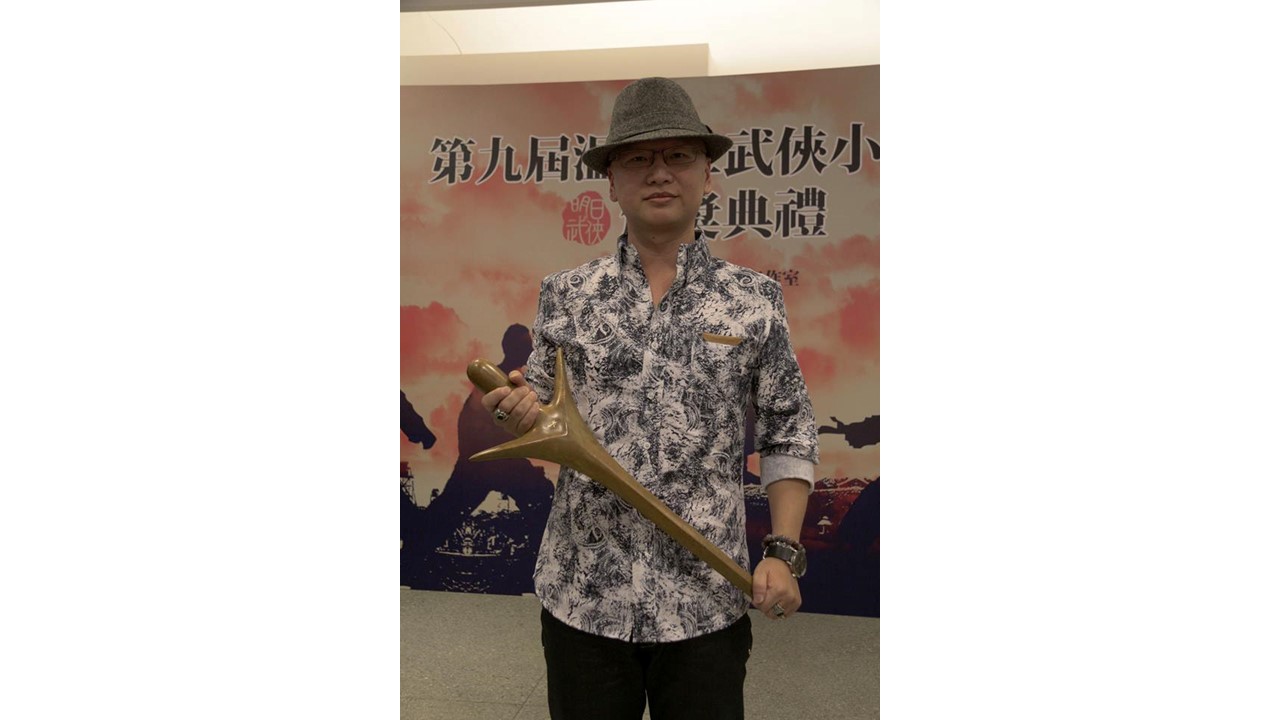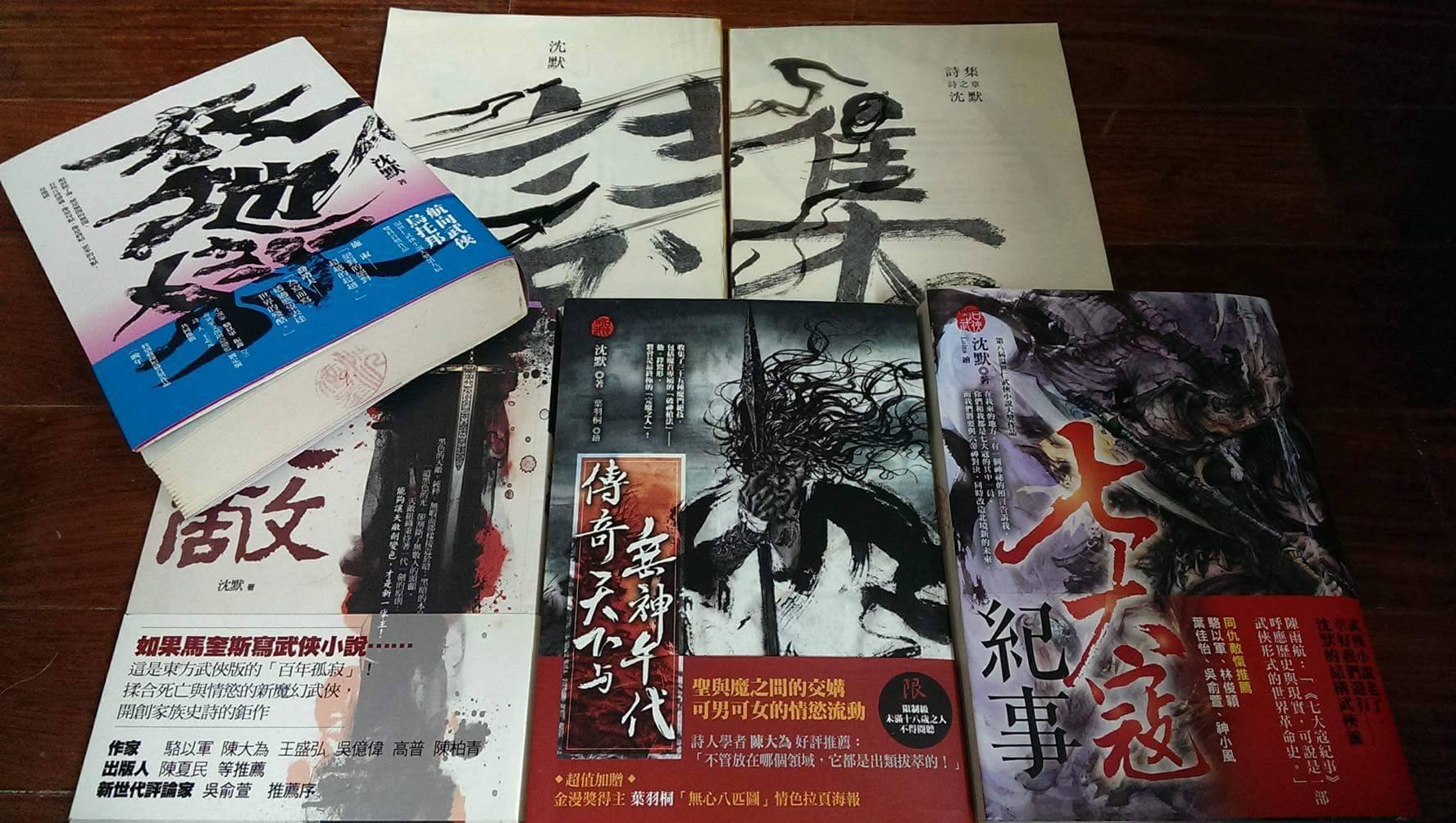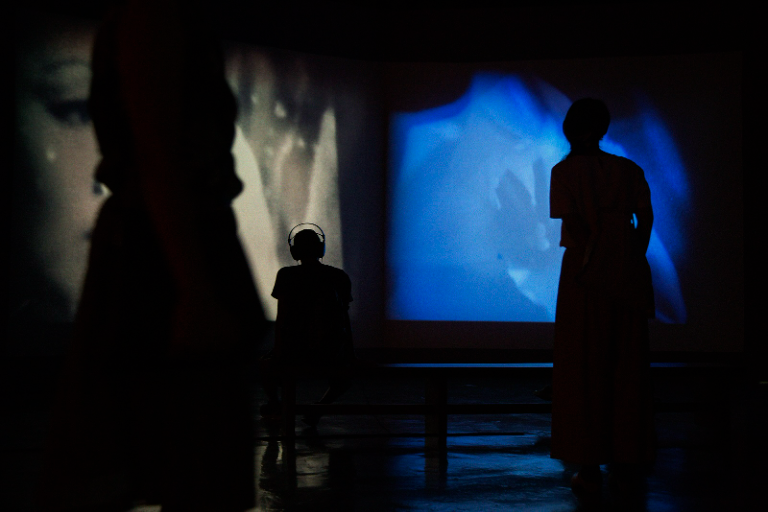In a Class of His Own
Since he began writing wuxia (martial heroes) novels as an undergraduate student, he has been dedicated to writing for a living. He regards the wuxia novel as his lifelong vocation, aiming to forge new paths for the genre. In the nearly 20 years of his writing career, he has published over 30 novels. His name is Mo Shen, a multi-time winner of the Sayling Wen Million-Dollar Prize for Wuxia Novels. In 2013, He won first place for both the long and short wuxia fiction categories with In Hell and Late Life, marking the zenith of his writing career. Even though the prize mentioned above is now discontinued, there is no pause to his writing, having published more novels including Natural Enemy, The World of Legends and the Godless Age, Chronicles of the Seven Bandits, The Phantom King, and In Hell. He remarked that everything in this world serves as inspiration for wuxia novels, so he has never experienced a shortage of materials or ideas. This could make many writers in Taiwan envious.
Into the World of Wuxia
He became acquainted with the wuxia genre early in his life—he has been reading wuxia novels since junior high school. Unlike most readers, who begin with Yong Jin's work before moving on to Long Gu's, he began reading Long Gu from the start. Stimulated by Long Gu's passionate, sentimental, even slightly melodramatic style, he thought: "So that's the wuxia novel? I'll try my hand too!" So, in his weekly student journal entries, he started serializing his first wuxia fictions for half a semester until his teacher asked him to stop, because the teacher found them incomprehensible. (Laugh)
In his senior high school years, he looked for wuxia materials from book rental shops. Back then, book rental shops could be found in every corner. He borrowed almost all the wuxia titles he got his hands on, including those of Fangyu Dong and the "three musketeers of wuxia", namely, Ling Sima, Qingyun Zhuge, and Sheng Wolong. Extensive reading also allowed him to develop the artistic sensibility to discern the quality of individual wuxia novels. However, when reading their novels, he could not help asking himself: "why did these pioneering writers only touch on a narrow range of topics and not explore more possibilities?" For instance, he was recently rereading Yong Jin's The Smiling, Proud Wanderer. He recalled how much he was fascinated with the "Nine Swords of Dugu", a set of sword skills including moves such as "Sword-defeating Stance" and principles such as "Moves outside tradition can overcome traditional ones". Yong Jin's wuxia is more emphatic on symbolism and martial arts simply serve as metaphors. However, Mo Shen remained mesmerized by the moves fabricated in Yong Jin's novels and looked forward to exploring these spectacular moves in depth. For this reason, in writing every novel, he finds it necessary to construct a comprehensive and distinctive martial arts system rather than just devising individual moves.
In a strict sense, however, he was introduced to the wuxia genre by the work of Yi Huang. The 1990s were the golden era of the publishing industry. Shattered Void, published by Crown Publishing, particularly influenced Mo Shen. He still remembers the thrill he experienced in reading the novel for the first time. This innovative wuxia novel, which incorporates mysticism and cosmology, brought an exhilarating reading experience he never had before: a cosmological vision fused into the wuxia world, which transcends life and death and expresses the poetry of life through martial arts. This vision is the most crucial reason for which Mo Shen admires Yi Huang.
The novel that achieved an unprecedented success and brought Yi Huang fame was Lethal Weapons of Love and Passion, thanks to the special marketing and pricing strategy of its distributor Wanxiang Publishing. At the time, the wuxia genre had experienced a slump in popularity. Yong Jin and Long Gu's prime years were behind them. Yi Huang's new approach to the genre by incorporating mysticism and science fiction became a new sensation. Legend of Great Tang's Two Dragons sold 20,000 copies for each of its 63 volumes, marking the zenith of Yi Huang's career as well as the best days of publishers.

Mo Shen wins first place for both the long and short wuxia fiction categories of the 9th Sayling Wen Million-Dollar Prize for Wuxia Novels in 2013 (photo courtesy of Mo Shen)
Wuxia Novelists to Admire
Yi Huang, who daringly incorporated a cosmology into the wuxia novel, became Mo Shen's hero. His masterpiece Lethal Weapons of Love and Passion, in particular, is unforgettable for its poeticism and the lyricism of its words. Although the text became repetitive as new volumes continued to appear, this novel remains Mo Shen's second favorite of all times.
The extraordinarily talented Rui'an Wen (Swee Oan Woon) is one of the few writers who could write both modern poetry and fiction. He founded Shenzhou Poetry Society at National Taiwan University and developed the "stream of consciousness" writing technique, for which he became a famous and popular writer at the time. However, Wen's outstanding prowess proved both advantageous and disadvantageous. Although he was invited to write as a columnist for many newspapers and journals, his wild creativity often resulted in an opening gambit too broad in scope to draw to a conclusion, which was a great pity.
Ta-Chun Chang's Gang of the City State brought Taiwanese wuxia novels to the next level. This novel broadened the horizon of the wuxia genre by incorporating metafiction into wuxia writing. It is Mo Shen's all-time favorite.
An Artist with a Rational Mind
While continuously exploring new possibilities for the wuxia novel, Mo Shen has a rational approach to writing and places an emphasis on logical thinking. Wild imagination must be grounded in a proper representation of human nature. For instance, he is not fully convinced that a slow-witted fool like Jing Guo in The Legend of the Condor Heroes can figure out a difficult martial arts book like the Nine Yin Manual. He confessed his dislike of the characters created by Yong Jin, because these superhuman perfections do not reflect reality. "I am very much concerned with what an individual character in a wuxia novel would do in response to their circumstances. These responses have to be realistic, without a shadow of fictitiousness." "The character xia in wuxia should be understood as a person caught in their circumstances," he remarked.
Erudition
As a wuxia novelist who continues to write, Mo Shen also continues to read extensively. His reading ranges from Chinese literature to translated works of foreign novelists. He also continues to pay tribute to great modern novelists with his own works. For instance, Natural Enemy, originally titled Two Hundred Years of Solitude, pays obvious homage to Gabriel García Márquez's One Hundred Years of Solitude, while Chronicles of the Seven Bandits pays homage to Milan Kundera. In addition, in the long acknowledgment in his Natural Enemy, he thanks Yi-Jun Luo, Italo Calvino, Wu He, Franz Kafka, Bohumil Hrabal, Umberto Eco, Kai-Cheung Dung, and others. During my interview with Mo Shen, he enthusiastically talked about authors who profoundly influenced his work, particularly José Saramago's The History of the Siege of Lisbon and Graham Greene's Brighton Rock. The Hong Kong writer Bik-Wan Wong's writing of pain inspired him to write about the body from the perspective of pain. Kai-Cheung Dung, another influence on Mo Shen, uses illness to lay bare the heart. The epic masterpiece Tangut Inn by Yi-Jun Luo, Taiwan's foremost novelist, brought him a reading experience of excitement and impact. He even read this book many times.
Life Is Never Elsewhere
Everyone has a different way of seeing the world, but artists are generally more attentive and sensitive to detail than the average person. During my conversation with Mo Shen, I came to admire him for savoring the day-to-day and feeling life with heart. He remarked, smiling, "I thought I was a weirdo, and later, I also felt that this eccentricity in my youth was like a wall that separated myself from the world. Whenever I looked at a chair, I tended to think that it was definitely not just a chair, so I spent my childhood chiefly in my own fantasy world. The world was not a projection of me. I was a projection of the world."
The only overseas trip he has made in his life was to San Francisco in the United States. After a flight of more than 10 hours, he landed on a foreign country and saw nothing really different from his home. So, he feels that people don't have to travel to a distant place to search for meaning in life, because everything around him means something to him. Even one's mother, someone who accompanies one every day in one's life, has many hidden stories to be discovered, as long as one is willing to look at her eyes and feel her heart. Therefore, "life is never elsewhere and our quest for the otherworldly is really just an illusion," he remarked.
Shift in Writing Style
Influenced by Yi Huang, Mo Shen began to write The Lonely Man when he was a college student. Skeptical about so-called history, he began to construct fictional martial arts worlds and invent martial arts systems. He stated that this is the approach he wants to use for exploring the possibilities of wuxia. However, his early style was still closer to traditional wuxia vocabulary, including the language used by Yi Huang, Rui'an Wen, and Yong Jin. When he was working on the At World's End series, he was studying modern poetry in university. He daringly introduced modern poetry into wuxia writing, transforming the genre into a medium or an artistic device. He might have been ahead of his time, for the sales of his work suffered a sharp decline and his publishers dissuaded him from continuing this writing style. Nevertheless, he continued writing while reading literature rigorously, including modern poetry. He also enjoys stage plays and art films, and within three or four years, he has watched hundreds of plays and written reviews on plays, films, and books. Years of training in this manner finally gave Mo Shen the confidence to start writing wuxia novels again. The outcomes are the titles we are now familiar with, such as The World of Legends and the Godless Age, Who Is the King of the Void, The Phantom King, and In Hell.

Mo Shen's wuxia novels
Breaking the Convention of Linear Narrative: The Sword Is Like Time
The Sword Is Like Time was inspired by the novel Cloud Atlas, which consists of six narrative segments. Each is presented in a different narrative style or genre, such as science fiction or romance fiction, and divided into two parts. The author presents popular fiction with ideas from serious literature. The novel's unconventional narrative structure inspired and was adopted by Mo Shen as the narrative framework for The Sword Is Like Time. Such ingenious approach to structure reflects exactly the disorder and even complete chaos of time.
For example, this book begins with "Part 2", followed by "Primeval Time", and ends with "Part 1". This structure really breaks the convention of linear narrative and shows that the novel is not limited to a single storyline but can present double or even multiple storylines simultaneously, which makes reading fun and writing venturous. Mo Shen believes that The Sword is Like Time is even more brilliant than his award-winning In Hell.
The theme of this book appears in the beginning, when a sword is being forged: from a stone in its original shape to its forging by the swordsmith, once the sword takes shape, people will think about how to use it. Such a chicken-and-egg situation is the central question Mo Shen wishes to explore in The Sword Is Like Time.
After a sword is made, someone develops a set of moves for this sword. The sword may be lost afterwards, but the moves remain and undergo many changes; however, these changes do not make the moves more comprehensive but, ironically, more fragmented. It becomes evident how the author has actualized his idea of writing serious literature in the form of wuxia. For Mo Shen, the evolution of the sword moves in The Sword Is Like Time also symbolizes the evolution of literature.
I asked Mo Shen about the positioning of The Sword Is Like Time, his latest creation. He laughed and said that since Who Is the King of the Void, every new book of his is like a new milestone. For someone whose daily routine cannot miss wuxia novel writing, such activity has long been the most important part of his everything life. Therefore, every time he completes a book, he feels like he has just completed his last one, while every new book is like his first, because it is filled with passion and new ideas.
Finding One's Place in the World Through Wuxia
When reading Mo Shen's wuxia novels, one must be prepared to become addicted to them. His confident and fluent writing style allows the reader to have a page-turning, delightful reading experience. For Mo Shen, exploring new possibilities of wuxia is what he is looking forward to whenever he sets out to start a wuxia novel. Every new conception is a new take on wuxia. Mo Shen's wuxia novels picture a fictional world, in which the art of characterizing and naming characters, the unique martial arts systems, and the minute details of narratives achieve a signature charm.
Mo Shen's astrological sign is Libra, which is guarded by Venus and suggests an extreme sensitivity to beautiful things. With an aestheticist personality and yearning for splendor, he names the character's weapons, their favorite snacks, and distant mountains so stunningly. For example, names of food such as swirling-cloud noodles, flower-cluster wine, clouds-on-water candy, dream-hag cake, blue-jade-flower tea, and more dazzle the reader. As he points out, details are the life of a novel. Concrete descriptions of colors, images, scents, and other types of minutiae can make readers feel the author's attentive and conscientious approach to creation.
In addition, in Chronicles of the Seven Bandits, gallantry has been superseded by a higher ideal and broader vision. It reverberates with history and reality, achieving a "history of world revolution" in the form of wuxia. Transcending the confines of genre, it is a piece of modern wuxia writing with a strong connection with reality. In Hell, which won first place in the Sayling Wen Million-Dollar Prize for Wuxia Novels, is an allegory of human desire caused by a muddling of the six sense bases (Buddhist concept). Each of the six protagonists symbolizes one of the sense bases, perfectly illustrating what will happen to human nature in the world of wuxia and what kinds of desire must be restrained...
While sex and violence is a common feature in the work of Mo Shen, there are also romantic and sentimental elements. The World of Legends and the Godless Age, for example, is about the yearning and despair for the wife Meng-Wa. The contrast between the innocent female protagonist and the violent male protagonist reflects the uncertainty of love at that time.
As a novelist who regards the wuxia novel as his vocation, everything in the world can be approached through the lens of wuxia. Although the heyday of wuxia is past, he still tries his best to open cross-genre possibilities and develop postmodern wuxia writing. He never has any expectations of his readership. Maybe he always writes for himself. "The world doesn't need wuxia. I need it. I need wuxia to define my place in the world and how I engage with the world," Mo Shen remarked.
*Translator: Linguitronics
More CASE STUDY

_1685344611325.png)
